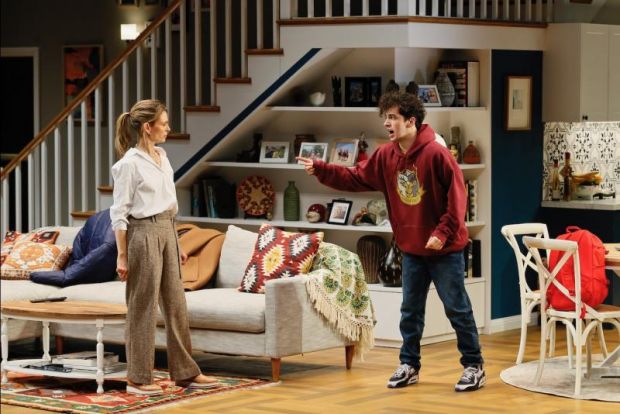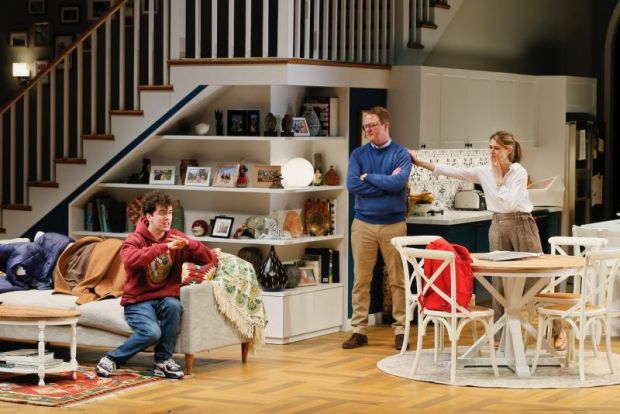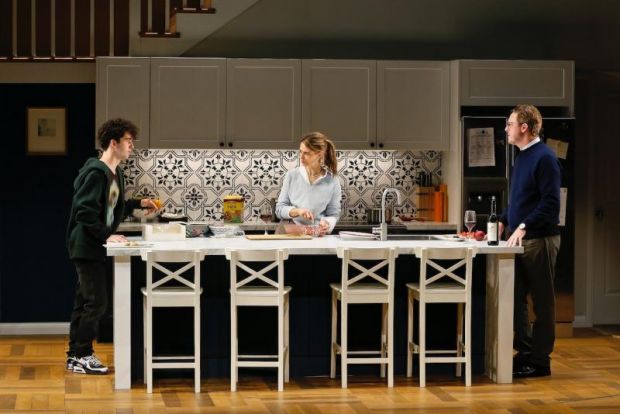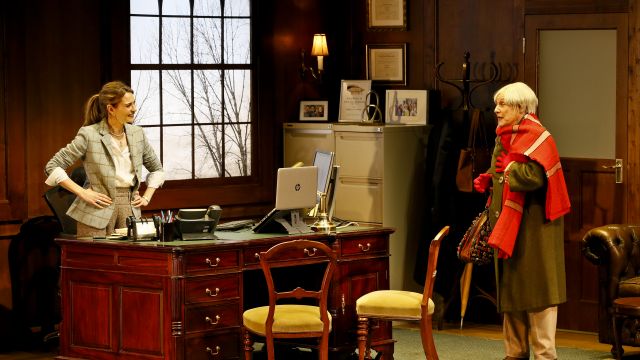Admissions
Joshua Harmon’s plays are ‘confronting’, or ‘provocative’ as we saw with his previous Bad Jews. Director Gary Abrahams reminds us of that in his excellent program notes. Admissions may make you squirm, get antsy, or, at best, feel uncomfortable – even while laughing. It’s a play about the racism that white folks don’t even know they have – and the ‘white privilege’ that, really, they’d rather not give up. It’s an American play, but its general line of attack – and attack it is – might be right at home here.
Sherri Rosen-Mason (Kat Stewart) is in charge of ‘admissions’ at a snooty but ‘liberal’ private junior school in New Hampshire. For years, she’s struggled to raise the percentage of black, Asian, and Latino students at the school. She’s been succeeding, and proud of it. Thus, the play begins with an argument between Kat and staff member Roberta (Deidre Rubenstein) over whether the photographs in the school’s promotional brochure are sufficiently ‘diverse’. For Sherri, absolutely not. Two black students when the percentage is close to 18%? Sherri’s less excitable but equally clear husband Bill (Simon Maiden) is the headmaster of the school, and he’s right behind her on this.
In other words, Bill and Sherri are a well-intentioned, ‘liberal’ couple comfortable with their assumptions and beliefs. Until, that is, their very smart but garrulous son Charlie (William McKenna) fails to get into Yale, while his best buddy Perry – who has a white mother, Sherri’s friend Ginnie (Heidi Arena), and a black father – does get in. Charlie is incandescent with rage and a lot of previously unexpressed and politically incorrect vitriol comes exploding out… All about ‘merit’ (his) and the ‘unfair’, skewed promotion of mediocrities.

Naturally, Sherri and Bill tut-tut, but are incredulous and dismayed – and straight away think about what strings they can pull to get Charlie into another ‘good school’. As Sherri points out, how can you do any good in the world if you didn’t go to a good school. Besides, this is her son, and what mother wouldn’t… etc.
We may wonder whether Sherri really cares about ‘diversity’ or just the look of diversity. She and Bill believe in ‘affirmative action’, sure – until, that is, it affects them. Naturally, Sherri’s pal Ginnie is thrilled and proud that her boy Perry got into Yale, but then Charlie goes and says Perry only got in because…
So, Admissions is a play about race and white privilege, but all the characters on stage are white. There are no black, brown, or yellow characters to argue their point of view. Harmon then is saying to us, ‘Who benefits from white privilege? White folks. So, let’s watch them stew in their own juice and see what comes out.’ It’s a smart strategy. In her 2017 book Why I’m No Longer Talking to White People about Race, Reni Eddo-Lodge complained that the vast majority of white people are unable even to listen when racism is pointed out to them. Ironically, her book has now become hugely popular with white folks – probably exactly the kind of white folks we see in Admissions.

Jacob Battista’s clearly naturalistic sets give us Sherri’s wood panelled, heavy-with-tradition office, and, on a revolve, her comfortable, middle-class home – both suggestive and perfect settings for the ruckus that ensues. James Henry’s sprightly music maintains the ironic comedy during the near seamless transitions. Everything here has been carefully considered.
Admissions is vastly entertaining even while we’re laughing at the characters’ double think’ and hypocrisy. Moliere and GB Shaw would approve. The characters are all gloriously smart and articulate in the expression of their self-serving views. Director Gary Abrahams reinforces the comedy with his great ability to physicalise thought and emotion – here especially with the frenetic Charlie – and William McKenna’s performance is pitch perfect. You know exactly how the kid feels even while you know he’s wrong. Or, come think of it, is he?
Others in this excellent cast may have been pushing just a little too hard on opening night, not allowing the comedy to speak for itself, but they all have to deliver big, big speeches and they’ll certainly find the right pace as the run goes on. Deidre Rubenstein gets it right from the start, but Heidi Arena rushes a little, making it hard to hear her. Kat Stewart beautifully transforms into the over-emotional (too much so, too early?) ‘professional’ American woman who can brush aside inconvenient contradictions. And Simon Maiden’s Bill is beautifully judged; he’s calm and matter of fact until he, too, explodes - and then he really explodes.

At the end of this ‘problem play’, white folks may be – or should be – wondering, ‘What would I do?’
Michael Brindley
Photographer: Jeff Busby
Subscribe to our E-Newsletter, buy our latest print edition or find a Performing Arts book at Book Nook.

